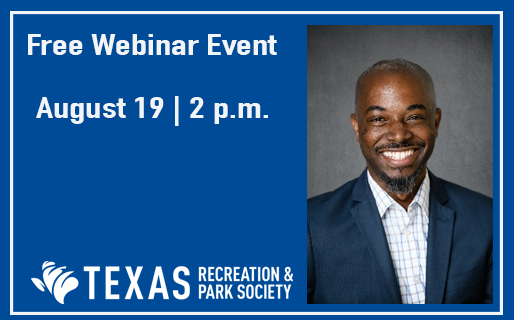The Future and Young Professionals Branch invites you to join them on Wednesday, August 19th at 2:00 pm for a LIVE webinar from leading researcher Dr. Pinckney from Clemson University. Dr. Pinckney will lead the group in identifying racial injustices (many that we are unaware of) within our own agencies and lead an intentional discussion on how to better address the needs of Black people in recreation.
This session is being brought to you by the TRAPS Future and Young Professional Branch in an effort to encourage dialogue about race issues in our field and to support the TRAPS’ vision, “to be the champion for engaged communities, wellness lifestyles and greenspaces.” This event is provided at no charge to TRAPS members and friends.
CEUS: CEUs are available at $15 (members) and $25 (non-members). Those seeking CEUs must participate in the live event. A recording will not be distributed after the event.
Session Description:
This session will examine how Race impacts the recreation of Black individuals and groups. We will identify challenges this particular group faces and develop actionable items you can take in your agency to promote positive change for Black users.
By the end of the session, participants will be able to:
- Identify ways in which Race impacts the recreation of Black individuals and families.
- Recognize the resources they can leverage to form stronger partnerships with Black communities.
- Implement strategies to better serve Black individuals and families in their local Park and Recreation Districts.
Dr. Pinckney requests that participants complete the following tasks prior to attending the webinar:
1. Read “Playing While Black” paper (approx. 20 min read)
2. Watch Brian Stevenson’s video (20 min in length)

Harrison Pinckney, IV is an Assistant Professor of Parks, Recreation, and Tourism Management at Clemson University. His research focuses on the factors that contribute to the positive development of black youth. He has led national studies examining the rites of passage programs and recently concluded a study exploring the impact of the movie Black Panther on black youths’ perception of self. Harrison is currently directing an NSF funded project that will seek to understand how community resources can be leveraged to encourage black youth to become scientists. Harrison believes the right opportunities combined with the assets black youth possess can position them to thrive in adulthood.
Sponsored by –

TRAPS is an IACET-accredited CEU provider.


